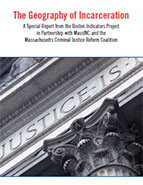The Geography of Incarceration: The Cost and Consequences of High Incarceration Rates in Vulnerable City Neighborhoods
 The Boston Foundation’s Boston Indicators Project, MassINC, and the Massachusetts Criminal Justice Reform Coalition, released today The Geography of Incarceration: The Cost and Consequences of High Incarceration Rates in Vulnerable City Neighborhoods, a new study that compares the geography of incarceration to the geography of crime in our city.
The Boston Foundation’s Boston Indicators Project, MassINC, and the Massachusetts Criminal Justice Reform Coalition, released today The Geography of Incarceration: The Cost and Consequences of High Incarceration Rates in Vulnerable City Neighborhoods, a new study that compares the geography of incarceration to the geography of crime in our city.
The report accessed a novel data set from Suffolk County Sherriff Steve Tompkins and depicts how incarcerations have had a disproportionate impact on Boston’s most vulnerable neighborhoods.
“This is needed work because the American criminal justice is characterized by high incarceration rates, especially for people of color. This produces cascading negative effects, not just on the lives of the imprisoned but on their families, neighborhoods and our city as a whole,” said Paul Grogan, President and CEO of the Foundation. “I’m hopeful that this work will build on the leadership Chief Justice Gants and the commitment from Governor Baker, Speaker DeLeo and Senate President Rosenberg to work with the Council of State Governments to produce meaningful reform.”
Among the report’s findings, are:
- Even as Massachusetts has touted its “progressiveness,” incarceration rates have been rising faster in recent years in this state than in the rest of the United States, as a whole.
- More was spent in 2013 incarcerating Codman Square residents than on statewide gang prevention efforts.
- The cost of housing all Suffolk County Jail inmates in 2013 was two-and-a-half times the Commonwealth’s combined FY13 budgets for Bunker Hill and Roxbury community colleges and nearly as much as Boston’s combined budgets for Parks and Recreation and Youth and Families departments.
The forum included a panel discussion with Suffolk County Sheriff Steve Tompkins, Boston City Councilor Andrea Campbell, State Representative Evandro Carvalho, and John Larivee, President & CEO of Community Resources for Justice. The report recommended a series of reforms, including the redesigning houses of correction so they excel at addressing risks and needs, and eliminating mandatory minimum jail sentences, and in increased focus on diversion and re-entry programming for offenders.
